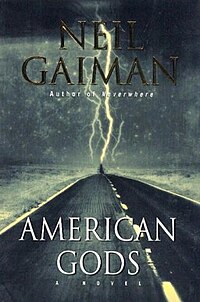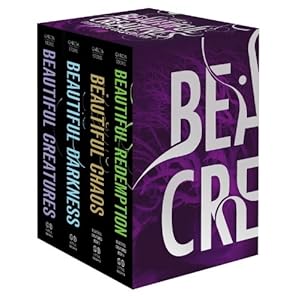American Gods by Neil Gaiman.
Without a doubt, one of the best books I have ever read, there is a reason why Neil Gaiman is one of the heavyweights of fantasy. I was familiar with Gaiman in general, though sadly I had not read anything of his until this book; he is credited with writing what is probably the best episode of Doctor Who of all time (The Doctor's Wife). This book is complex and thoughtful with a large mythology but enough magic that suspends my need to have all my questions answered. Shadow, the main character, has just been released from prison after a few years and is trying to make his way in the world once more. Along the way he meets the mysterious Mr. Wednesday who wishes to hire Shadow as a bodyguard, more or less. Wednesday, a prolific con man, takes Shadow across country, introducing him to his incredibly colorful friends. Eventually the crux of the novel is revealed to Shadow, though the audience has already caught on. Mr. Wednesday and his friends are gods from the old world, transplanted to America by immigrants and travelers because--quite simply--they believed in them. People carry their gods wherever they go and thus gods from Viking mythology (Mr. Wednesday is a specific iteration of Odin), Egyptian myth (Mr. Ibis and Mr. Jaquel), Slavic myth (Czernobog), African folklore (Mr. Nancy), and even Native American traditions are scattered across the American landscape. But the old gods, as they call themselves, have a problem: they are dying in the face of the new gods of technology and media. America, we are told, is a bad place for gods. What ensues is a cosmic con and battle in which Shadow is part hero, part sacrifice. As a student of religion, the take on how the gods still survive in a land such as America was fascinating. How are mythologies and the figures of those myths transformed in new places? Can myths of the old world that so informed a people and a culture of long ago survive in land fueled by "new" and "innovative?"
Overall grade: A+ (Just read it!)
The Fault in Our Stars by John Green
If you look at any list of the top YA fiction for 2012, you'll find this book. Chances are if you look at several lists for the best books of 2012, this book is on there. For a time, you couldn't turn the corner in a bookstore without running into TFiOS. I have to admit, I was already predisposed to like anything John Green wrote, even though I was rather late in the game with reading this book. When he's not writing compelling young adult fiction, John Green is one half of the YouTube channel, the Vlogbrothers with his brother Hank, who have been trying to decrease world suck since 2007. I've been a member of their community (the Nerdfighters) for sometime. Communicating with mainly teenagers and young adults a few times a week, it's no surprise that Green knows how to write a book that is both funny and heartbreaking and altogether real. TFiOS tells the story of two cancer patients, Hazel and Gus, who meet in a support group. Sounds depressing, I know, but this not a cancer book. A cancer book would have our two young heroes struggle through their disease, coming to accept it and learn the value of living life to the fullest before quietly making peace with their inevitable death. No so with Hazel and Gus who are sarcastic and quick witted and who hate everything about their cancer. Life is not a platitude and knowing pain does not increase your feelings of joy. Hazel recognizes that someday, after she dies, she'll be forgotten, just as everyone else will. Oblivion is there, accept it. But along the way, these two souls find one other and even though they know that their deaths will affect the other in horrible ways, the choice to love one another was a simple one. You will laugh and you will cry and this book will stay with you.
Overall Grade: A
Divergent by Veronica Roth
In the wake of wildly successful and popular Hunger Games, it seems that post-apocalyptic dystopia novels are everywhere, and mostly found in the Young Adult section of the bookstore. The Divergent series follows in that wake. Dystopian literature is a personal favorite, Brave New World being one of the high school books that I actively remember and one that stayed with me. However, I remember hesitating before finally picking up this book: how could it be better than the Hunger Games (which is simply phenomenal, even though I don't agree with the ending)? However, Roth takes a different approach than Collins with her heroine; where Katniss knows that her society is tragically flawed and wrong, Beatrice Prior (Tris) spends the first half of the novel in passive acceptance of the society in which she lives. Somewhere in the not too distant future in Chicago, humanity has divided itself into factions based on virtues: candor, erudite, amity, dauntless, and abnegation. At the age of sixteen, a young adult chooses to either stay in the faction of their birth or leave for the one they feel fits them. Factions rarely interact with one another, so choosing to leave the faction of your birth possibly means never seeing your family again. Tris, born to Abnegation, is torn when the test taken at school reveals that she could potentially belong to several factions. This "affliction" is known as Divergence and is feared and prosecuted. Tris is told to keep it to herself for fear that she'll be harmed. What follows is a coming of age story as Tris struggles to accept her differences, her new faction, but also as she uncovers a plot that seeks to rip the society apart. Naturally there is a romance, though thankfully we are spared the typical love triangle that so often accompanies young adult literature these days. The concept itself is interesting though I found myself often wondering how someone could possibly be just ONE of those virtues and I have a sneaking suspicion that might be Roth's point, what drives her novel. Trying to separate out those virtues is next to impossible not only because of how hard they are to define but also because, for example, being brave can also mean being selfless or honest or smart. It's amazing more characters aren't Divergent. This is the first of three books, the third due out this year. The second book picks up where the first leaves off and then turns everything upside down so that the wait for the final book is close to excruciating. The middle section where Tris is learning how to be a member of her new faction drags on a bit and the secret plan she uncovers is a bit confusing, but it is well worth the read.
Overall Grade: B+
Miss Peregrine's Home for Peculiar Children by Ransom Riggs
An unbelievably strange book that combines myth, fantasy, time travel, pocket universes, and vernacular photography, this is a very interesting debut from Riggs. After the death of his grandfather, Jacob Portman is convinced that something terrible happened to the old man. His grandfather's stories of monsters and special children on a magical island seem the ravings of a senile mind until Jacob begins investigating. On a small isolated part of Wales, Jacob discovers a place pocketed away from time, where children who are "peculiar" live in a time bubble during World War Two. Some children can float, some can control fire, some have bees covering their face, and one child is even invisible. There are creepy monsters and an entertaining plot, but what really makes this book worth the read are the black and white photos sprinkled throughout. At first, I thought I would find them annoying but it's amazing how well they work with the narrative, fitting into the story at just the right moments. It was obvious that Riggs spent countless hours hunting down these photos to use, pouring through garage sales and personal collections. The photos are strange (like the cover photo of a girl floating) and are obviously "faked" but that is washed away in the explanation of who the children in the photos are. A very delightful read, I look forward to the sequel.
Overall Grade: B+
The Beautiful Creatures Collection by Kami Garcia and Margaret Stohl
Vampires, werewolves, succubi, inccubi, magic, witches, prophecy, and Southern manners surround this series of four supernatural novels. Typical gender roles are reversed in this series; instead of the guy being the supernatural creature with whom the young girl falls madly and inconsolably in love, Ethan Wate is a normal guy living in the deep south, in a tiny town where nothing exciting ever happens and all he can do is hope to escape. That is until Lena Duchannes comes to the town of Gatlin. Lena, it turns out, is a Caster (witch) and a super powerful one at that. On her 16th birthday she will be claimed (against her will) for either the Light or the Darkness. If she goes Dark, chances are she will not remember her love for Ethan. On top of the world's worst birthday present, Lena's mother is out to make sure her daughter goes Dark. The series is supernatural mythology run amok. Every conceivable supernatural trope you can think of is present and at times not well put together. It felt, occasionally, like the authors simply inserted crucial new information at just the right moment for our heroes, but information which had never been even so much as hinted at in earlier pages. The first book--Beautiful Creatures-- is interesting and gets the series off to a good start. However the middle two--Chaos and Darkness--suffer heavily from "middle book syndrome," especially the former which I had to force myself to "just get through." The final book brings back some of the things I liked about the first book. Supernatural books are in high demand right now and there are stronger series out there, but setting the series in the deep south and then making the ideals and customs of that local like another character in the book does make this series stand out. Lazy summer day or beach read at best.
Overall Grade (as a whole): C
This is just a small sampling of some of the books I've read. I think I'll try to review most of them sporadically as I continue blogging. In the meantime, just go out and buy American Gods already!


_by_Veronica_Roth_US_Hardcover_2011.jpg)


I'm enjoying reading all your musings. You have me convinced to read American Gods. So when I finish my current book that one will be on my list! :)
ReplyDelete